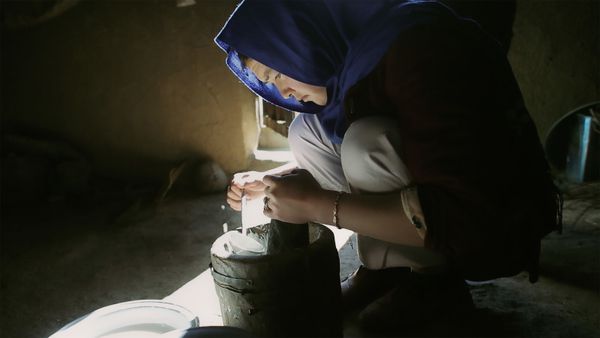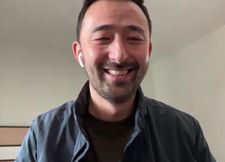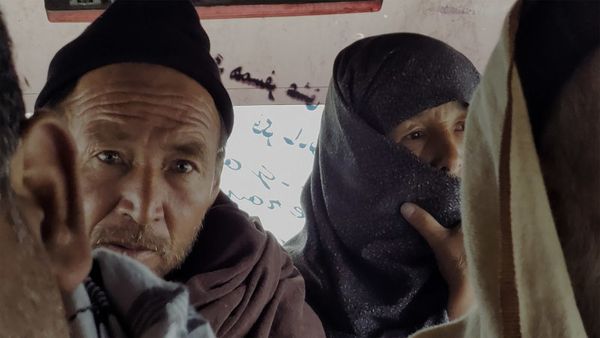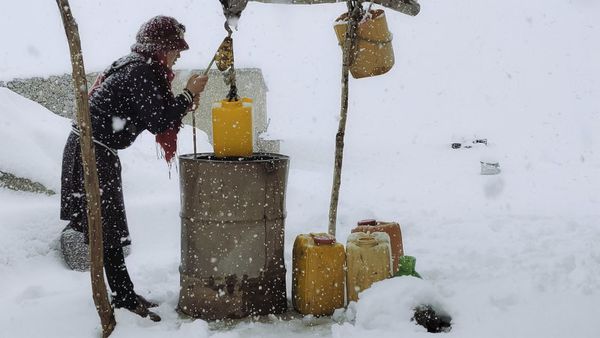 |
| Freshta in Kamay. Ilyas Yourish says he was 'impressed by her voice, the way she observed the parents' efforts for seeking justice and her perception of justice' Photo: Kamay Film |
 |
| Ilyas Yourish: 'Since I'm a Hazara myself, I have been carrying this historic trauma, like all the other Hazaras living in Kabul' |
Ilyas Yourish and Shahrokh Bikaran’s documentary Kamay charts a Hazara family’s quest for justice in an Afghan society where their ethnic group has been historically oppressed. When one of their daughters, Zahra, dies by suicide at university in Kabul, her mother, father and younger sister Freshta face multiple obstacles of distance, bureaucracy and prejudice as they try to discover the truth surrounding the circumstances of her death. Kamay, which takes its name from an ancient plant that grows in the mountains of central Afghanistan, had its premiere at Visions du Réel in Switzerland this week.
When I catch up with Yourish - who is from the Hazara community himself but who now lives in Belgium - he says the historical context is crucial to the film. This is emphasised by a beginning intertitle explaining the campaign of violence waged on the Hazaras in the late 19th Century by Afghan Amir Abdul Rahman Khan leading to a massacre of half the population. It also details an incident in which a group of 40 Hazara girls chose to jump from a cliff rather than be enslaved.
Yourish emphasises “this story is not happening in isolation”.
He adds: “It's not something that is new or recent. It's basically a cycle that is moving. And with each turn of the cycle it's becoming even more intense and hard. So the film is also like a cycle that starts with the uprising and at the end we see again, the abandoning and the displacement. And now we are in this new cycle and this new cycle is even more brutal with the Taliban - to all the people of Afghanistan, especially the women of Afghanistan, and narrowing it down to the Hazara, the killing of whom has always been used as a motive for the fighters and for the radicalisation of the troops. It's an incentive for them to kill Hazaras, that's how they're brainwashed. And now imagine they are in control of policing the Hazaras.”
Yourish said he came across the story because Zahra’s suicide at Kabul university provoked a strong reaction from the community, with 1000s of people taking to social media to write about it.
He says: A lot of them were current and former students of Kabul University, most of them female students, who opened up probably for the first time about the toxic environment and the suffering they have been through at the university.
“So there was a moment and all the media in Afghanistan was talking about that. But for me, it was an ordinary day. It was in the morning that I was scrolling through social media and then I came across this news and I felt like something was burning inside me for a lot of reasons. First of all, I'm the second generation of my family who had had the privilege to study at Kabul University. My mother was among the very few and first Hazara female students of Kabul University, who eventually was teaching there at the science faculty. My two sisters are at Kabul University. I also studied at Kabul University. And I had heard and I had witnessed countless stories and countless incidents.
 |
| Zahra's parents Hawa and Younes in Kamay, who the director describes as 'strong and articulate' Photo: Kamay Film |
“But again, since I'm a Hazara myself, I have been carrying this historic trauma, like all the other Hazaras living in Kabul. So all these elements got together, plus that I was an avid reader of world literature, I loved cinema, as a viewer, that I loved art and that I was working as a journalist and researcher.”
Yourish recalls the first time that he called up Zahra’s father Younes and explained that he wanted to make a film about what had happened.
“He told me, ‘If you're telling the truth, and if you and if you want to make a film about this, my house’s door is always open to you’.”
Getting to the door of the family was no easy feat as it is in a village in the remote province of Daykundi - a long distance from Kabul and one that is emphasised as we see the family making the difficult journey back and forth in search of answers about their daughter.
“It was a 20 to 24-hour drive with pauses in between,” says Yourish, who says it was also something of a “personal journey” as it marked the first time that he had visited his family’s home region. Younes was surprised to get a call from the filmmaker once he arrived but again offered him access and “he stood firm on that decision”.
Yourish adds: “That was the beginning of a long relationship between us that eventually developed and I'm proud and honoured to be a part of the family.”
He and his co-director began filming in November 2017 and continued right until the end of July 2021. He notes some of their team are still in Kabul with their families and continued to film even after the Taliban had regained power.
The voice that guides us through the story is that of Freshta. We hear it in voice-over, addressing her sister and expressing her grief and fears about the future.
Yourish says: “At first, I had an eye on the parents because they're such strong, articulate characters, but also they had a journey basically, that was observable. For me as a filmmaker, I could just turn on the camera and follow them, which was the easiest way.”
 |
| Freshta provides a voice-over for the film written in collaboration with the filmmakers. Yourish notes: 'It was written and recorded when we were both in exile' Photo: Kamay Film |
But he adds that when he went for the first time to Daykundi and sat to talk with all of the family members individually, he was “impressed by her voice, the way she observed the parents' efforts for seeking justice and her perception of justice”.
This was when the kernel of the idea came up concerning the memories Freshta had of her sister and her intention to continue on her sister’s path.
“She was very young, but she was very thoughtful,” he says. “And when we went back and saw the interview at home, we knew that she was the one who would tell the story.”
Yourish explains that the final narration for the film was a collaboration between the filmmakers and Freshta. “It was written and recorded when we were both in exile,” he notes, since Freshta and her family have also since left Afghanistan.
“That’s why she talks about this past that has been lost and that’s why this pain is inside her,” he adds. When we were at the editing stage and she was looking at the footage and reading, I could see how she was really reflecting on those last moments. I think that’s where this magical voice comes and I think that’s something that really touches the audience.”
The family - who have now safely relocated to Germany - are hoping the film will help them to take their advocacy for Zahra and the Hazara people more generally out into the world. They hope to initiate a foundation to help other young women pursue their education outside of Afghanistan in the memory of their daughter and are in the process of trying to find partners to assist with that.
Yourish, meanwhile, has two other feature films in progress and he’s also co-producing a short documentary that will be released by The Guardian.
“Of the two feature length documentaries, one of them is situated in Balochistan of Pakistan where there's a population of nearly a million Hazara, who moved there since the suppression of the uprising in the late 19th century. And that has been a hub for all the Hazara to run away from the persecution in Afghanistan. Then there's another film that I'm producing with a collective of filmmakers, some of whom still live in Kabul. The characters are strong young Hazara girls in the west of Kabul, who are navigating life under the Taliban gender apartheid regime and who are fighting and resisting in their own way.”
The short documentary details are more under wraps but he says it is named House No.30 Kabul, directed by Abbas Rezaie, and is based on Rezaie’s feature documentary The Etilaat Roz, about a newspaper in Kabul and about the journalists who are navigating the rule of the Taliban.
For more information about Kamay and Yourish’s other projects visit Kamayfilm.com





















